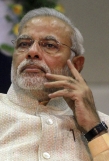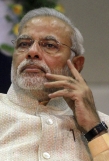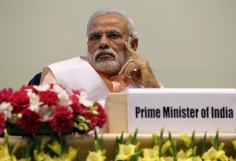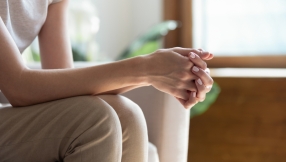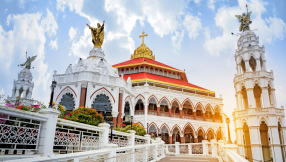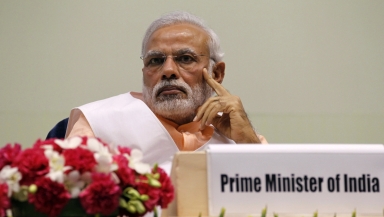
When Narendra Modi first came to power one year ago, there were significant concerns that religious persecution would increase under his government. The newly ruling Bharatiya Janata Party (BJP) promised greater protections for religious minorities, but its links to right-wing Hindu nationalist organisations meant that minority faiths remained sceptical.
When the BJP won by a landslide victory in May 2014, Church leaders scrambled to congratulate Modi on his ascension to power. Cardinal Telesphore Toppo, former president of the Catholic Bishops Conference of India, was one of those quick to praise Modi's "dynamic leadership". He even branded the prime minister's victory, and majority support, "heavenly indications that many problems facing the country such as poverty, unemployment, caste and communal divide, insecurity of women, deteriorating law and order and others would be addressed firmly and for the common good."
However, the All Indian Christian Council expressed reservations. National coordinator Kumar Swamy told Christian Today at the time that extremist Hindu groups had helped to "inflame" the BJP and increase its popularity, and warned that persecution would increase under its rule. "I'm sure there will be increased sporadic, localised attacks in the Christian community," Swamy said. "Modi's background is that he is sold out for Hindu ideology; he was a member of a right wing Hindu group and we as the Christian community in India are sitting, fingers crossed, wondering, waiting and watching what is going to happen."
One year on from Swamy's predictions, and it looks like his concerns were warranted. Speaking anonymously to Christian Today, a country expert for Christian Solidarity Worldwide (CSW) said that the climate for religious minorities has become "more and more uncertain in the last year".
"Since the BJP took office in parliament, there has been greater impunity in the way that extremist groups have been behaving in civil society, so more and more we hear from the ground that minorities in the country are feeling a sense of fear and concern for their future," the source said.
He confirmed that there have been a "surge in attacks against religious minorities" in the past few months, now numbering around 600. Between December and February, five churches were attacked in Delhi alone, with incidents including arson, vandalism and burglary. An elderly nun was gang raped at a convent school in the east of the country in March, and a story has emerged in the last few days of a pastor imprisoned in Odisha state on trumped up charges of forced conversion. These serve as confirmation of concerns about Modi's attitude to religious minorities, the source said, adding that the Delhi church attacks have been dismissed by the Indian courts as petty crime, rather than as religiously motivated; a sign that persecution is not being taken seriously by the government.
Though he has largely stayed silent on these issues, Modi did condemn the nun's rape and called for an investigation into the violence. A series of tweets from his office expressed his "deep concern" regarding the incident:
Despite this apparent show of concern, the CSW spokesperson said that it has made no difference to life on the ground for Christians in India, who have taken to the streets to protest increased persecution in recent months. "Ever since coming out [to call for better protections for minority groups], nothing has actually happened," the source explained. "It's just a lot of talk, we have not seen any action on the ground."
Religious freedom has, at least, been bought to the fore in terms of now being openly discussed. Barack Obama highlighted tensions during a trip to India in January, calling on Modi's government to protect vulnerable groups.
"Your Article 25 [of the constitution] says that all people are 'equally entitled to freedom of conscience and the right freely to profess, practise and propagate religion'," Obama told a town hall address in New Delhi. "In both our countries, in all countries, upholding this fundamental freedom is the responsibility of government, but it's also the responsibility of every person."
But while Modi's administration is no doubt aware of the issues, they have largely been "swept under the carpet," in favour of a focus on international trade and development, the CSW expert said. "More often than not, the BJP shrugs off [persecution] as not an important thing."
And yet for religious minorities in India, it is a daily battle. The BJP is the political wing of the Hindu nationalist NGO Rashtriya Swayamsevak Sangh, known as the RSS, which holds incredible sway in the country. The World Hindu Council, Vishwa Hindu Parishad (VHP), is the religious wing, which uses nationalist ideology to promote Hinduvata – equating being Indian with having a Hindu faith. Boasting almost seven million members, it regularly holds "reconversion" programmes, where Indian minority communities are encouraged to turn to Hinduism. The group has claimed that conversion to faiths other than Hinduism, including Christianity, is "the root of terrorism".
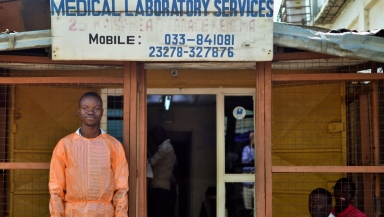
There has been a rise in hate speech against religious minorities even from those who hold senior positions within these organisations, the CSW spokesperson said. Human Rights defenders are considered to be at particular risk, as those who speak out on behalf of marginalised groups are finding themselves increasingly the target of harassment, with no repercussions for the perpetrators.
"Modi has been in power for over a year, and up to now what we've seen is a lot of talk, and not any action on the ground as far as taking action to protect the interests of religious minorities," the expert added. "It will get worse if no action is taken."
The chief of the RSS, Mohan Bhagwat, recently called for India to return to a 100 per cent Hindu state – meaning that those of other faiths would be forced to convert.
"Something needs to be done in terms of ensuring that people like Bhagwat, and very senior people in these groups and even Members of Parliament within the BJP, are kept in check," the expert concluded.
"If we don't see any form of the government ensuring that these people are controlled, we're going to see widespread reconversions taking place, and more structural attacks on churches and places of worship...We're seeing slowly and slowly the creeping in of Hinduvata ideology in various aspects of civil society, so we need to engage with the Indian government, and there has to be more dialogue at an international level."










